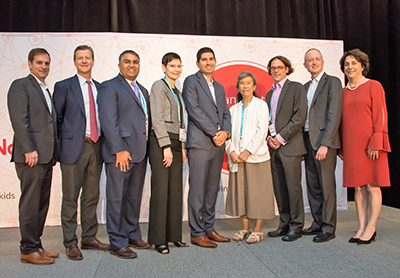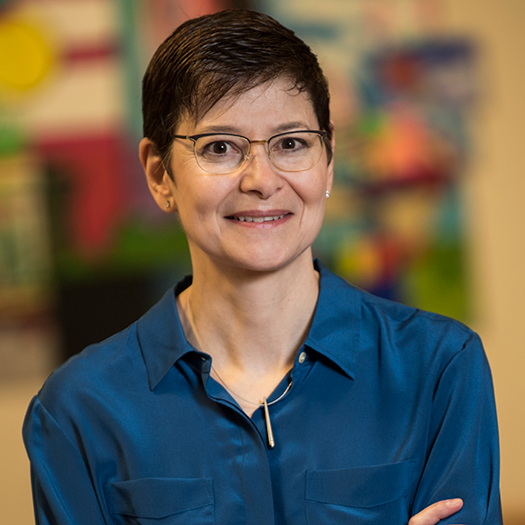Six NICU Device Innovators Share $150K in Awards at 7th Annual Pediatric Device Innovation Symposium

WASHINGTON – Children’s National Hospital and the National Capital Consortium for Pediatric Device Innovation (NCC-PDI) announce the six winners of the $150,000 “Make Your Medical Device Pitch for Kids!” competition, each receiving a $25,000 award and the opportunity to participate in NCC-PDI’s recently launched “Pediatric Device Innovator Accelerator Program” led by MedTech Innovator. The six winners, who presented medical devices designed to improve Neonatal Intensive Care Unit (NICU) care, emerged from a field of 11 finalists. Each participant delivered their five-minute live pitch presentation to a panel of 25 esteemed judges during the 7th Annual Pediatric Device Innovation Symposium hosted by Children’s National.
The award-winning pediatric devices and companies are:
- AlgometRx, Inc., Washington, D.C. – The AlgometRx Rapid Drug Test is used to detect and monitor neonatal abstinence syndrome, allowing for earlier assessment and intervention of opioid withdrawal to reduce physiological stress.
- Epitel, Salt Lake City, Utah – Epilog is an inexpensive, discrete and disposable EEG machine that provides real-time monitoring to revolutionize the way neonates suspected of hypoxic-ischemic encephalopathy are managed at community hospitals.
- Novonate, South San Francisco, Calif. – LifeBubble secures and protects the umbilical catheter insertion site for neonates in intensive care, preventing infection from caregivers and parents.
- PyrAmes Inc., Cupertino, Calif. – Noninvasive and wireless, the Boppli Band allows for risk- and pain-free continuous blood pressure monitoring for neonates.
- Raydiant Oximetry, Mountain View, Calif. – Raydiant Oximetry Sensing Systems is a novel, non-invasive technology that more accurately detects fetal distress during labor and delivery, reducing medically unnecessary cesarean deliveries and the occurrence of newborns suffering the consequences of metabolic acidosis.
- Rhaeos, Inc., Evanston, Ill. – FlowSense is a wearable device that enables noninvasive monitoring of ventricular shunt function in patients who have hydrocephalus, obviating the need for imaging and unnecessary hospital visits and admissions.
“Congratulations to these outstanding innovators and startup companies for developing pioneering medical devices that can advance NICU care,” says Kurt Newman, M.D., president and CEO of Children’s National. “Our Children’s National clinical team, which is ranked #1 nationally in NICU care, understands deeply the vital role of innovation and technology in providing the tiniest infants with the healthiest start possible. Three of our NICU clinicians participated in the judging and were inspired by the quality of the participants and the potential patient benefits of the innovations presented.”
Nearly 400,000 babies, about 1 in 10, are born prematurely in the United States annually. The Centers for Disease Control and Prevention states that premature babies who survive can have breathing issues, intestinal problems and brain complications that can impact later development. The competition focused on NICU because the Food and Drug Administration (FDA) identifies the specialized pediatric market among those that still have a significant unmet need for devices designed for the youngest patients.
“Given the fragile nature of neonates, continuous health monitoring is vital for early detection of adverse events,” says Kolaleh Eskandanian, Ph.D., vice president and chief innovation officer at Children’s National and principal investigator of NCC-PDI. “Improved neonatal monitoring devices, such as those among our award winners in this year’s competition, can make a critical difference in detecting interventions that could positively impact the long-term developmental trajectory of many children.”
The competition was sponsored by the NCC-PDI, one of five FDA-funded grant programs focused on addressing unmet needs for pediatric medical devices. The consortium is led by the Sheikh Zayed Institute for Pediatric Surgical Innovation at Children’s National and the A. James Clark School of Engineering at the University of Maryland. NCC-PDI recently added new accelerators BioHealth Innovation and MedTech Innovator and design firm partner, Archimedic.
“The judges were impressed by the winning device developers’ ability to identify and respond to clinical challenges in the NICU with innovative solutions that will improve outcomes and give hope to families whose babies require critical care,” says Eskandanian. “We welcome these companies into the NCC-PDI network of device startups and entrepreneurs and look forward to helping them accelerate commercialization so that these innovations can benefit children everywhere as soon as possible.”
The winners were announced and celebrated during the closing reception of the pediatric device symposium, which co-located with The MedTech Conference for the third consecutive year. Widely recognized as the premiere annual gathering for pediatric device innovation, program highlights included an opening keynote address by Melinda Richter, Global Head at Johnson & Johnson Innovation - JLABS, and a closing address by Vasum Peiris, M.D., chief medical officer, Pediatrics and Special Populations, Center for Devices and Radiological Health, FDA.
In an on-stage discussion, Richter and Dr. Newman shared details of the recently announced collaboration to launch JLABS @ Washington, DC, a 32,000-square foot facility to be located at the new Children’s National Research and Innovation Campus on the former Walter Reed Army Medical Center campus in the nation’s capital. The JLABS @ Washington, DC site will be open in 2020 to pharmaceutical, medical device, consumer and health technology companies that are aiming to advance the development of new drugs, medical devices, precision diagnostics and health technologies, including applications in pediatrics. AlgometRx, one of the day’s pitch competition winners, was selected earlier this year to join the JLABS location in Philadelphia.
This year’s symposium addressed the theme “Pediatric Device Clinical Trials: Forging a Better Path” with multidisciplinary panels exploring ways to optimize the pediatric device clinical trial process. Solutions uncovered during these panels will be highlighted in a forthcoming white paper focused on best practices to safely validate medical devices for children more efficiently and effectively.
For more information about innovation at Children’s National visit childrensnational.org/research-and-education/sheikh-zayed. To learn more about the winners of the “Make Your Medical Device Pitch for Kids!” competition, visit innovate4kids.org.
Media Contact
This is a carousel. Use Next and Previous buttons to navigate, or jump to a slide with the slide dots.





